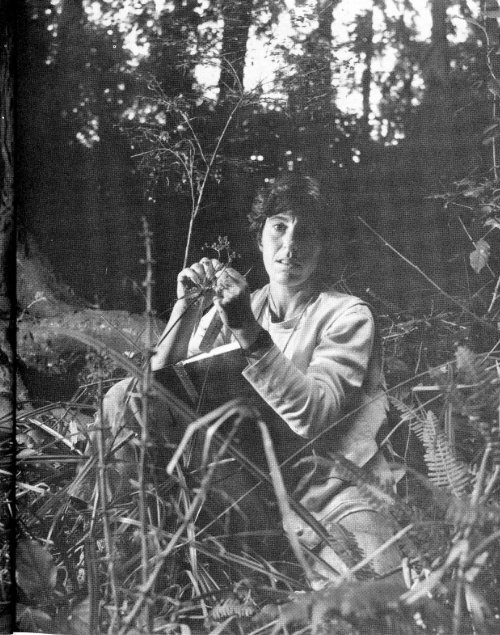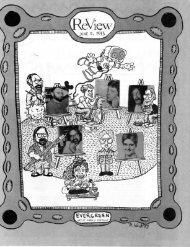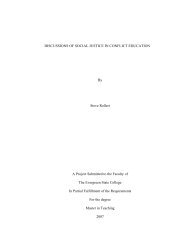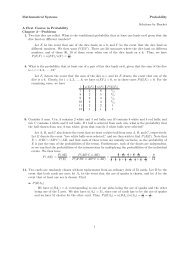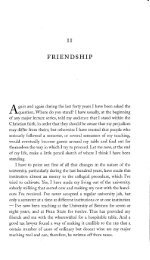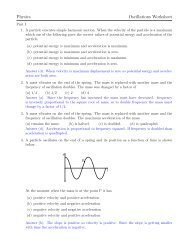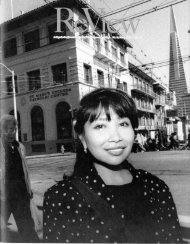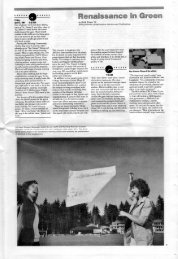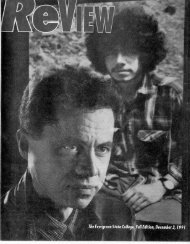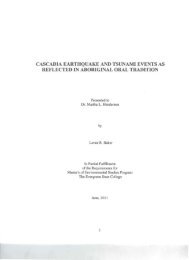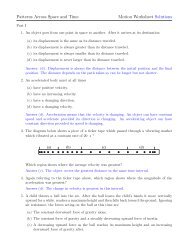V12 #1 November 1990 - Archives - The Evergreen State College
V12 #1 November 1990 - Archives - The Evergreen State College
V12 #1 November 1990 - Archives - The Evergreen State College
You also want an ePaper? Increase the reach of your titles
YUMPU automatically turns print PDFs into web optimized ePapers that Google loves.
grass roots, the community.<br />
And my third is to my organization."<br />
Steel is aware that<br />
protecting endangered species<br />
means making economic<br />
choices that are going to hurt<br />
people. When asked if he finds<br />
it uncomfortable to live and<br />
work in a community so<br />
polarized over the forest issue,<br />
his reply is unhesitating. "I<br />
never apologize," he says. "I'd<br />
rather deal with hostility than<br />
apathy any day."<br />
He empathizes deeply with<br />
those who are caught in the<br />
middle. At the same time he<br />
believes that environmental<br />
degradation has gone too far<br />
for painless solutions. "We<br />
can't compromise life. Extinction<br />
is the bottom line. <strong>The</strong><br />
burden of proof in this<br />
discussion has always been on<br />
the environment and now that<br />
has to change."<br />
<strong>The</strong> people that Argon<br />
Steel has no empathy for are<br />
cynics. "We're on a campaign<br />
that's winning and I will not<br />
tolerate pessimism. I mean,<br />
what's the point? People need<br />
to be empowered. You need to<br />
point out solutions or there's<br />
no use for you," he says.<br />
"No one would do this<br />
work for the money. <strong>The</strong> thing<br />
that makes this winnable is<br />
passion, and that passion<br />
includes all your sadness and<br />
anger as well as your love. It<br />
can be hard. You can get<br />
sucked into this work body and<br />
soul and it will suck you dry,<br />
but you've got to maintain<br />
your idealism. Like I said,<br />
we're winning."<br />
LOGGER<br />
continued from page 12<br />
Roberts performs two<br />
kinds of work. Mostly, he's a<br />
troubleshooter, dealing with<br />
permits, public agencies,<br />
insurance companies, banks,<br />
etc. but he also fills in as a<br />
loader and operator of<br />
construction equipment when<br />
needed.<br />
His days as a loader begin<br />
at 4:30 a.m., he's out on the<br />
site, loading trucks by 5:30.<br />
"We did away with a lot of<br />
luxuries during the early 80s<br />
crunch," he says. "Like the 8hour<br />
day with coffee breaks<br />
and a long lunch hour. Now<br />
it's 10-11 hours: eat your lunch<br />
in the cab; got to go? you do it<br />
off the running board-keep the<br />
engine running, hop back in<br />
and keep loading."<br />
Fortunately, today, a<br />
dazzling morning in late<br />
September, is a troubleshooting<br />
day. We'll have plenty of time<br />
to talk as we travel down<br />
Highway 8 between stops in<br />
and around Montesano,<br />
Aberdeen and Hoquiam.<br />
<strong>The</strong> company that Roberts<br />
works for employs about 50<br />
people -more or less, depending<br />
on the availability of work.<br />
Diversity, he says, is the key to<br />
survival. Several years ago 90%<br />
of the company's revenue came<br />
from logging; now it's around<br />
60%. <strong>The</strong> rest of the revenue<br />
comes from construction and<br />
road building, land development<br />
and two logging supply<br />
stores. On the way to the<br />
office, located about 20 miles<br />
west of <strong>Evergreen</strong>, Roberts<br />
elaborates on the theme of<br />
diversity:<br />
"Two years ago we sold<br />
off most of our heavy equipment.<br />
We made the decision<br />
that it wasn't feasible for us to<br />
log at the level of intensity it<br />
takes to cut on federal lands. If<br />
we have economic options,<br />
such as developing real estate,<br />
we don't need to log old<br />
growth to-<br />
"Hey, there you go," he<br />
says, interrupting himself and<br />
pointing to a hillside, "that's<br />
what I was talking about<br />
before."<br />
All I see are trees: dark fir<br />
on the ridge and upper slopes;<br />
alder and other leafy trees<br />
below. But what Roberts sees is<br />
an unmanaged forest. "See how<br />
the firs peter out and there's all<br />
those junk trees below? Well,<br />
that's because after they cut it,<br />
they didn't reseed, but let it<br />
happen on its own. A certain<br />
amount of alder is desirable,<br />
but not that much."<br />
I begin to ask more about<br />
this but we're interrupted by<br />
the phone. It's a call from the<br />
office, advising Roberts to<br />
make sure the local fire<br />
department has been notified of<br />
a burn that the company will<br />
be conducting on a site near<br />
Montesano. "People see<br />
smoke," explains Roberts, "call<br />
the fire department, and then<br />
there's hell to pay if they come<br />
roaring out with their trucks<br />
and find out it's a controlled<br />
burn that we forgot to tell them<br />
about.<br />
"So much of this job is<br />
p.r.," he says. "That thing," he<br />
adds, pointing to the cellular<br />
phone, "is as much a tool of<br />
logging these days as a chain<br />
saw."<br />
Most of Roberts' logging<br />
career has not been spent on<br />
the phone. He got his first job<br />
as a chokesetter when he was<br />
18. <strong>The</strong>n he was a "whistle<br />
punk," using an electronic<br />
whistle to signal the engineer<br />
who operates the machinery<br />
that hauls the logs to the<br />
landing. He worked for his<br />
uncles in the summer while he<br />
went to school, then set<br />
chokers, blew whistle and<br />
loaded for big companies and<br />
gypos alike. He also worked<br />
for a time at Camp Grisdale,<br />
the state's last logging camp (it<br />
closed in 1985).<br />
"I've had to make an<br />
adjustment in transitioning<br />
from the production end of this<br />
business to what I do now. I<br />
mean when you're on a site,<br />
you know you're working<br />
hard. But I tell myself that<br />
what I'm doing now is just as<br />
important as loading or setting<br />
chokers.<br />
As I was saying the other<br />
day to John, the guy I was just<br />
on the phone with, most of us<br />
don't necessarily get a rush out<br />
of doing routine logging jobs<br />
anymore. We like the situations<br />
where we have to solve<br />
problems. Like you," he says,<br />
nodding toward my notebook,<br />
"You live for getting out of the<br />
office and solving the problem<br />
of how to write down what<br />
you're seeing."<br />
He's right and what I'm<br />
seeing now is a different<br />
Highway 8 than I'm used to.<br />
For years it's just been the road<br />
to the ocean. To Roberts, it's<br />
neighborhood. <strong>The</strong>re's a cut<br />
that his brother worked on,<br />
here's a job he worked on, and<br />
a piece that his uncles logged<br />
six years ago- "Hey, look how<br />
well the trees are coming back.<br />
See last year's growth, the<br />
distance between the highest<br />
spikes and the top? About a<br />
foot! That's a good reprod<br />
job." <strong>The</strong> object of his admiration<br />
is a dense stand of six- to<br />
eight-foot tall firs.<br />
His enthusiasm diminishes,<br />
however, as we round a curve.<br />
Dead ahead is a great, ugly hill.<br />
It's being clear cut and stands<br />
out from the green hills around<br />
it like a scab. Roberts pulls<br />
over to the side of the road. It's<br />
not the clear cut he minds (all<br />
along, he's been showing me<br />
stands of timber grown from<br />
clear cuts), but the way it's<br />
being done. "See those dark<br />
lines up there? Those are<br />
furrows. <strong>The</strong>y're caused by<br />
dragging the logs to the tower.<br />
<strong>The</strong>y don't have a suspension<br />
system so the logs tear up the<br />
soil, causes erosion and makes<br />
it hard to replant. That's the<br />
kind of crap that makes us all<br />
feel bad about logging."<br />
r A few miles later, we take a<br />
two-track into the woods<br />
outside of Montesano. <strong>The</strong> first<br />
thing I hear as I step out of the<br />
truck is the high, sharp pipings<br />
of the tower whistle. <strong>The</strong> tower<br />
is the mechanism that cables<br />
the logs off the cut and up to<br />
the landing area. <strong>The</strong> whistle<br />
communicates between the<br />
crew on the ground and the<br />
operator.<br />
We walk up a short rise<br />
and look down on the loading<br />
operation. On a small hilltop<br />
there's a log truck half-full of<br />
logs, a bright yellow loader (a<br />
sort of forklift with jaws) and a<br />
fifty-foot steel tower. Cables<br />
run out from the top of the<br />
tower across a valley to a<br />
cutting site on the other side of<br />
the next hill.<br />
Two men are on the<br />
ground, limbing logs and<br />
coiling wire. <strong>The</strong>y're dressed in<br />
boots, pants with the cuffs torn<br />
off (so the cloth, if snagged,<br />
will tear rather than hold)<br />
wide-brimmed hardhats and<br />
red suspenders. (Everybody,<br />
including Roberts, wears red<br />
suspenders).<br />
"Those guys are in what<br />
we call 'the F...ing Bight,'" says<br />
Roberts, referring to the<br />
narrow, dangerous corridor<br />
between tower, logs, loader,<br />
truck and cable. "Something<br />
goes wrong in there, there's not<br />
a lot of room to get out of the<br />
way."<br />
One of the men in the<br />
bight waves and walks up the<br />
hill to us. Roberts introduces<br />
me to his brother -a muscular,<br />
younger version of himself.<br />
<strong>The</strong>y don't say much -a few<br />
words about Grandma and<br />
when this job will end. <strong>The</strong>y<br />
stand by an ancient stump, one<br />
that was hand-notched and cut<br />
over 100 years ago (this current<br />
cut is harvesting third growth<br />
timber). <strong>The</strong> brother's stubbled<br />
face is dark from the sun; so<br />
much darker and healthierlooking<br />
than the recreational<br />
tans that I'm used to seeing in<br />
the office. He gives me a wide<br />
grin, shakes my hand, and<br />
bounds down the hill. I catch<br />
myself wondering, and not for<br />
the first time, whether it's a<br />
better life out here in the<br />
woods.<br />
"Hey, don't forget," says<br />
Roberts, reading my mind,<br />
"that we're seeing them on a<br />
good day. I mean, more often<br />
than not, we're talking cold,<br />
rainy days; dangerous, slippery<br />
logs, and being clammy right<br />
down to your underwear."<br />
<strong>The</strong> whistle blows, the<br />
cable tightens and over the rise<br />
of the far hill comes a canvas<br />
cradle of three two-ton logs.<br />
Roberts says some technical<br />
things, pointing out the<br />
suspension system that keeps<br />
the logs from furrowing the<br />
soil. But I'm not really listening.<br />
Routine as it may be, there<br />
is something breathtaking<br />
about the logs appearing over<br />
the crest of the hill; not unlike<br />
the moment when you first see<br />
a hooked trout breaking the<br />
water. It's also like the first trip<br />
to a dairy farm when you<br />
realize that milk doesn't just<br />
come from a carton at Safeway,<br />
and beyond that, that it just<br />
doesn't come from a cow (or a<br />
forest) but through immense<br />
human effort.<br />
Later in the day we drive down<br />
the streets of Montesano, a<br />
town of about 2000. It's three<br />
in the afternoon, hot as<br />
midsummer and quiet: people<br />
are still at work, children at<br />
school. <strong>The</strong> houses are older<br />
and well-kept; there's little<br />
development, no condos in<br />
sight. <strong>The</strong>re are also fewer of<br />
the lime-green, stenciled signs<br />
that we saw everywhere in<br />
Aberdeen:<br />
"THIS FAMILY<br />
SUPPORTED BY<br />
TIMBER DOLLARS."<br />
But that doesn't mean that<br />
"timber" isn't here: it's a<br />
universal thread through all of<br />
Roberts' memories. He points<br />
out the streets where his uncles<br />
live, only a block apart. <strong>The</strong>y<br />
logged. Uncle Ken, in his 70s,<br />
still has a shop where he works<br />
on logging equipment. We<br />
drive past the house where his<br />
family once lived. His father<br />
drove a logging truck. House<br />
after familiar house contains or<br />
once contained a family he<br />
knew, a family in which<br />
members of two, three, and<br />
sometimes four generations<br />
harvested lumber.<br />
He points out timber<br />
mansions and says, "<strong>The</strong>se<br />
'mansions,' (though they're not<br />
really that big) are on the same<br />
street with everybody else's<br />
houses. <strong>The</strong>y didn't take the<br />
money and run or shut<br />
themselves off from the rest of<br />
the town."<br />
Roberts, who now lives in<br />
Olympia, says "Monty" hasn't<br />
changed much. He recites the<br />
names of the stores that he<br />
knew as a kid. Most are still<br />
there. We drive by a gleaming,<br />
block-long fire station.<br />
"That's timber money," he<br />
says, "<strong>The</strong> money to build that<br />
station was donated by a<br />
retired logger. See, you can't<br />
cut that cord. Timber is a part<br />
of this town, part of our<br />
history. It'd be like saying let's<br />
have southern France without<br />
wine growers."<br />
Roberts, himself, comes from a<br />
four-generation logging family.<br />
His great-grandfather moved to<br />
the Northwest in the 1880s and<br />
cleared the land. His sons,<br />
grandsons and great grandsons<br />
worked as loggers, millworkers<br />
or hauled logs to the mills.<br />
Roberts' 93-year-old<br />
grandmother, a bright, sharp<br />
woman who still lives in<br />
Montesano, remembers the<br />
backbreaking work of former<br />
days: "Gee, it was so bard to<br />
clear the land," and you can<br />
sense from her words the<br />
massive forests looming before<br />
the homesteaders and their<br />
puny saws and axes. Who<br />
among them would've guessed<br />
that the day would come when<br />
such forests would ever be in<br />
danger?<br />
As we leave Montesano,<br />
Doug muses: "<strong>The</strong> curious<br />
thing is that I don't represent<br />
the typical logger, but my<br />
background is so typical, so<br />
intricately webbed with<br />
timber."<br />
I ask if he's ever thought<br />
of doing something else. "Sure,<br />
I've got a college education.<br />
I've got skills. I could do a lot<br />
of things, but it's tough to<br />
explain. <strong>The</strong>re's a certain feel, a<br />
certain smell. It's a way I<br />
ground myself..."<br />
I mention that such<br />
sentiments on the part of<br />
loggers rarely get transmitted in<br />
the media. He laughs and says,<br />
"You know most environmentalists<br />
have never seen a logger.<br />
Loggers are environmentalists.<br />
We spend 10 times more time<br />
in the wilderness than they<br />
do."<br />
We drive for awhile in<br />
silence, while Doug searches<br />
for the right words: "I mean<br />
you can't help but be mesmerized<br />
by the sight of snow<br />
crystals on the pines when<br />
you're going to work at dawn.<br />
We're farmers, really. You<br />
know the media depiction of<br />
farmers—down on their knees<br />
with their hands in the dirt?<br />
Well, we're farmers, too. We're<br />
close to the earth."<br />
16 THE EVERGREEN REVIEW FALL <strong>1990</strong> 17


